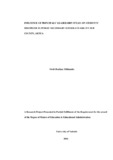| dc.description.abstract | The purpose of this study was to investigate the influence of principals’ leadership styles on students’ discipline in public secondary schools in Kikuyu Sub County, Kenya. The specific objectives were to establish the influence of democratic leadership style, transactional leadership, authoritarian leadership style and transformational leadership style on students’ discipline in public secondary schools in Kikuyu Sub-County, Kenya. The research applied descriptive research design employing stratified random sampling technique. The study sampled 230 teachers and 28 principals. Questionnaires were used for data collection due to the ability to collect information from a large population within a short period of time with relative ease. Reliability was determined through test-retest method and calculated using Pearson’s correlation coefficient resulting in coefficient value of 0.8 for teachers’ questionnaire and 0.9 for principals’ questionnaire. Validity was ensured through discussion with the experts (supervisors) and using questions framed in less ambiguous way. Data was analysed using descriptive statistics assisted by SPSS and presented in tables and graphs. The findings showed the existence of a positive relationship between the principal’s leadership style and students’ discipline. The study also found out that authoritarian style of leadership is practiced and this has both positive and negative influence on discipline. Democratic style of leadership is partially practiced where most principals chose when to and when not to involve members in decision making. The use of democratic leadership had a positive impact on students discipline, hence needs to be strengthened. Various aspects of transformational leadership style such as charisma, idealised influence, inspirational motivation and individual consideration were being practised, and these had a positive bearing on the discipline of the students, especially the application of guidance and counseling. The study also found out that the principals applied transactional leadership styles in the schools where punishments and rewards were being used to reinforce discipline. This style was also found to influence the discipline of students positively especially where the students were encouraged to follow and adhere to school rules and regulations. The researcher recommends that: Board of management of schools should hold regular meetings with students to listen to their grievances; MoE should organize seminars and workshops to: create awareness to teachers on transformational leadership style that stresses guidance and counseling of students; train principals on the need to emphasize transactional leadership that stresses observance of school rules and regulations; Sub County Directors of Education should organize workshops for teachers that emphasize the need for school managers to act on the needs and aspirations of the students to avert irresponsible behavior; and teacher training institutions and management training institutions like KEMI should modify their curriculum to include leadership aspects that nurture desirable behavior but shun those that glorify undesirable behavior. The researcher suggests a further study to be done on: the influence of leadership styles on the academic performance; the influence of leadership style on the school culture and climate; school-based factors that may influence students’ discipline other than principal’s leadership styles; and the influence of BOM characteristics on students discipline in secondary schools. | en_US |



